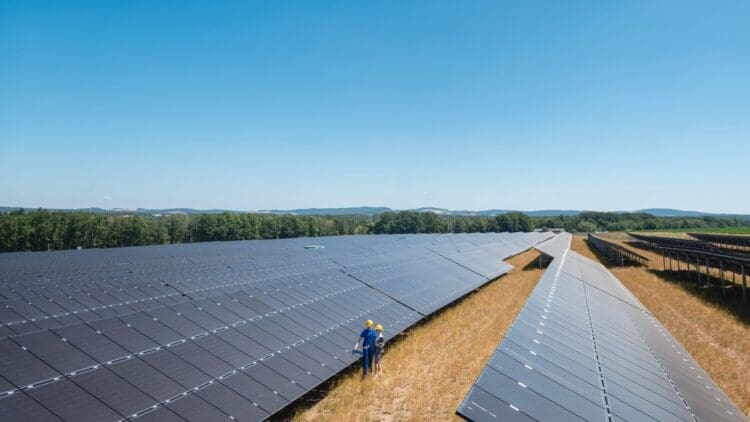The renewable energy sector has been boosted by the news that the United Kingdom’s Cleve Hill Solar Park has begun operations with 373 MW capacity. Additionally, the site will feature a battery storage system and could provide crucial power to 102,000 homes. The landmark solar park features an array of over 550,000 solar photovoltaic modules and has been classified as a Nationally Significant Infrastructure Project (NSIP) for the UK. Cleve Hill was granted development consent by the Secretary of State for Business, Energy and Industrial Strategy in May 2020.
The Clevel Hill Solar Park is now operating at full capacity and exporting energy at 100%
The world has been consumed by the current transition away from the non-renewable energy sector towards projects like Clevel Hill that accelerate the global transition to the renewable energy sector. Projects across the world are popping up that strengthen the prominence of wind power in the global energy industry.
Cleve Hill serves as a landmark achievement for the UK energy sector. It was the first project of its kind that was consented as a Nationally Significant Infrastructure Project (“NSIP”). The site’s contractor, Quinbrook Infrastructure Partners, has announced the successful completion of construction and has noted that operations on site are underway.
The site’s 373 MW capacity is more than four times the size of the next largest operational UK solar project. Cleve Hill is supported by the largest solar and battery storage project financing in UK history. Quinbrook, the site’s operator, received a GBP 218.5 million term loan and a GBP 20 million VAT facility with Lloyds and NatWest, which exemplifies the nation’s cooperative approach to the solar sector.
“Cleve Hill sets a new benchmark for large-scale solar projects to help decarbonise the UK power system and demonstrates how investing in the infrastructure needed to transition the UK to clean energy can support local communities and create new jobs. The UK’s ongoing commitment to progress its energy transition and decarbonise the economy represents a strong conviction as a nation to a renewable energy future, one that is underpinned by a huge pipeline of large-scale infrastructure projects that will support growth, jobs and cheaper power for UK households.” – Keith Gains, Managing Director and UK Regional Leader for Quinbrook
The Cleve Hill Solar Park helps to shift the UK energy sector towards the potential of solar power
The UK, along with every other nation that signed on to the Paris Agreement, is working exceedingly hard to decarbonize the energy sector. The global consensus calls for more work to be done to reach the emission goals that were agreed upon at the Paris Agreement Summit a few years ago.
Several high-energy usage nations are building huge solar farms that further the progress of transitioning the global energy sector towards the renewable energy sector. The landmark project has the potential to reduce carbon emissions by more than 142,000 tonnes during the first year of operations. Additionally, the site will provide 2,500 direct and indirect jobs.
“Quinbrook is proud to further enhance our track record of successfully delivering milestone infrastructure projects that create such a meaningful and positive impact for the UK’s energy transition. Projects like Cleve Hill set new scale benchmarks that should increase confidence that the UK’s renewables targets can be achieved” – Rory Quinlan, Quinbrook’s Co-Founder and Managing Partner
The solar power sector is gaining momentum as the world moves away from coal and gas
The global transition to the renewable energy sector is nearing its end. Several nations across the world have commissioned huge solar projects that enable them to reduce their reliance on the coal and gas sectors in favor of the more environmentally friendly energy capacity that solar and wind present. Africa, for example, is turning to Chinese-made solar panels as deployment of the technology accelerates. One thing that is for certain is that the UK is one step closer to the ambitious goals self-imposed by the Paris Agreement.






